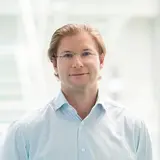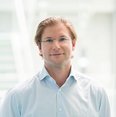Chronic Inflammation and Cancer
- Immunology, Infection and Cancer

Prof. Dr. Mathias Heikenwälder
Our laboratory aims at understanding the different immune signatures of chronic inflammatory human diseases (with focus on liver diseases) and how those trigger liver damage and liver cancer using relevant mouse models - with the final aim to generate models of chronic inflammation potentially used for pre-clinical research.

Our Research
Inflammation exists in several different flavors. Already, the time span of inflammation is a first parameter. Whereas short-lived inflammatory reactions are rather indicative of an acute, regenerative process, chronic inflammatory reactions can be deleterious causing subsequent diseases such as autoimmunity-driven tissue damage or even cancer development. In the case of liver cancer development several different chronic etiologies have been identified: chronic viral infections with Hepatitis B and C virus, chronic alcohol consumption or a high calorie diet combined with insufficient movement. Yet, no effective therapy is available that could cure liver cancer patients.
The best treatment available today is a pan-tyrosine kinase inhibitor (Sorafenib) that prolongs the lifespan of late stage patients by approximately three months. At the same time we are facing a strong rise in HCC incidence and are missing appropriate therapies. Great advances have been made to eradicate some of the etiologies of liver cancer formation (e.g. efficient treatment of HCV infections), whereas other etiologies of liver cancer – such as non-alcoholic fatty liver disease (NAFLD) and non-alcoholic steatohepatitis (NASH) are strongly increasing in industrializing but also developing countries and will further rise in the next years. Thus, more appropriate preclinical models as well as better immunological, genetic and molecular understanding is needed to generate new and effective therapies.
Our laboratory aims at understanding the different immune signatures of chronic inflammatory human diseases (with focus on liver diseases) and how those trigger liver damage and liver cancer using relevant mouse models - with the final aim to generate models of chronic inflammation potentially used for pre-clinical research. Thus, we focus on comparative studies of human and animal model tissues, recapitulating human disease on a histo-pathological and pathophysiological level. We engage in classical molecular biology techniques complemented with sophisticated ways to receive as much information from tissue samples through histology (e.g. light microscopy/ immune fluorescence/ FISH/ in situ hybridization), in vivo imaging techniques (e.g. MRI) as well as FACS analyses for tissue homogenates.
FUTURE OUTLOOK
We are also interested in the systemic functional effects of pathologies and the interplay between several affected non-lymphoid tissues and the immune system. Finally, testing several therapeutic compounds in a single use but also combinatorial fashion is one of our goals employing established and stratified pre-clinical mouse models.
Epigenetic dysregulation is a major driver of tumorigenesis. Little is known about how dysregulation of epigenetic machineries affect the nucleosome remodeling activity or contribute to tumorigenesis. Here, Dr. Singh’s group aims to elucidate the regulatory logic of epigenetic machineries and their dysregulation in cancer, deepening our understanding of the mechanisms of epigenetic dysregulation in cancer and potentially identifying new therapeutic strategies for a wide variety of cancers.
Team
45 Employees
-

Prof. Dr. Mathias Heikenwälder
-
Silke Abele
-
David Aicher
-
Tania Araujo Ramos
-
Tabea Bieler
-
Michaela Blanfeld
-
Dörte Brokering
-
Sara Candida Barbosa
-
Carsten Deppermann
-
Anna-Lena Eck
-
Hazal Ergelen
-
Zeynep Ergün
-
Sarah Flößer
-
Winnie Fong
-
Rebecca Fontes Silva
-
Dr. Suchira Upeksha Gallage
-
Andreas Graur
-
Feng Han
-
Johannes Hanselmann
-
Michaela Hart
-
Danijela Heide
-
Simon Heyse
-
Rebecca Jasser
-
Aikaterini Kadianaki
-
Shing Kam
-
Dr. Katharina Kommoss
-
Daniela Kramer
-
Indresh Kuppanur Gopalsamy
-
Michael Lehmann
-
Dr. Xin Li
-
Florian Müller
-
Claudia Müller
-
Sandra Prokosch
-
Dr. Mohammad Rahbari
-
Nuh Rahbari
-
Dr. Pierluigi Ramadori
-
Vikas Prakash Ranvir
-
Maria Reich
-
Friedrich Reusswig
-
Ulrike Rothermel
-
Benjamin Schinkel
-
Peng Shen
-
Dr. Indrabahadur Singh
-
Rene Tykwe
-
Sainan Zhang
Selected Publications
Gallage S, Ali A, Barragan Avila JE, Seymen N, Ramadori P, Joerke V, Zizmare L, Aicher D, Gopalsamy IK, Fong W, Kosla J, Focaccia E, Li X, Yousuf S, Sijmonsma T, Rahbari M, Kommoss KS, Billeter A, Prokosch S, Rothermel U, Mueller F, Hetzer J, Heide D, Schinkel B, Machauer T, Pichler B, Malek NP, Longerich T, Roth S, Rose AJ, Schwenck J, Trautwein C, Karimi MM, Heikenwalder M
Gallage S, Avila JEB, Ramadori P, Focaccia E, Rahbari M, Ali A, Malek NP, Anstee QM, Heikenwalder M
Pfister D, Núñez NG, Pinyol R, Govaere O, Pinter M, Szydlowska M, Gupta R, Qiu M, Deczkowska A, Weiner A, Müller F, Sinha A, Friebel E, Engleitner T, Lenggenhager D, Moncsek A, Heide D, Stirm K, Kosla J, Kotsiliti E, Leone V, Dudek M, Yousuf S, Inverso D, Singh I, Teijeiro A, Castet F, Montironi C, Haber PK, Tiniakos D, Bedossa P, Cockell S, Younes R, Vacca M, Marra F, Schattenberg JM, Allison M, Bugianesi E, Ratziu V, Pressiani T, D'Alessio A, Personeni N, Rimassa L, Daly AK, Scheiner B, Pomej K, Kirstein MM, Vogel A, Peck-Radosavljevic M, Hucke F, Finkelmeier F, Waidmann O, Trojan J, Schulze K, Wege H, Koch S, Weinmann A, Bueter M, Rössler F, Siebenhüner A, Dosso S, Mallm JP, Umansky V, Jugold M, Luedde T, Schietinger A, Schirmacher P, Emu B, Augustin HG, Billeter A, Müller-Stich B, Kikuchi H, Duda DG, Kütting F, Waldschmidt DT, Ebert MP, Rahbari N, Mei HE, Schulz AR, Ringelhan M, Malek N, Spahn S, Bitzer M, Ruiz de Galarreta M, Lujambio A, Dufour JF, Marron TU, Kaseb A, Kudo M, Huang YH, Djouder N, Wolter K, Zender L, Marche PN, Decaens T, Pinato DJ, Rad R, Mertens JC, Weber A, Unger K, Meissner F, Roth S, Jilkova ZM, Claassen M, Anstee QM, Amit I, Knolle P, Becher B, Llovet JM, Heikenwalder M
O'Connor T, Zhou X, Kosla J, Adili A, Garcia Beccaria M, Kotsiliti E, Pfister D, Johlke AL, Sinha A, Sankowski R, Schick M, Lewis R, Dokalis N, Seubert B, Höchst B, Inverso D, Heide D, Zhang W, Weihrich P, Manske K, Wohlleber D, Anton M, Hoellein A, Seleznik G, Bremer J, Bleul S, Augustin HG, Scherer F, Koedel U, Weber A, Protzer U, Förster R, Wirth T, Aguzzi A, Meissner F, Prinz M, Baumann B, Höpken UE, Knolle PA, von Baumgarten L, Keller U, Heikenwalder M
Get in touch with us

